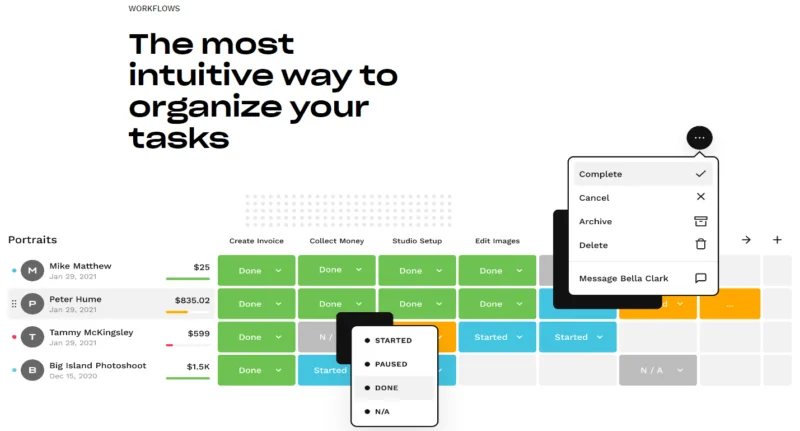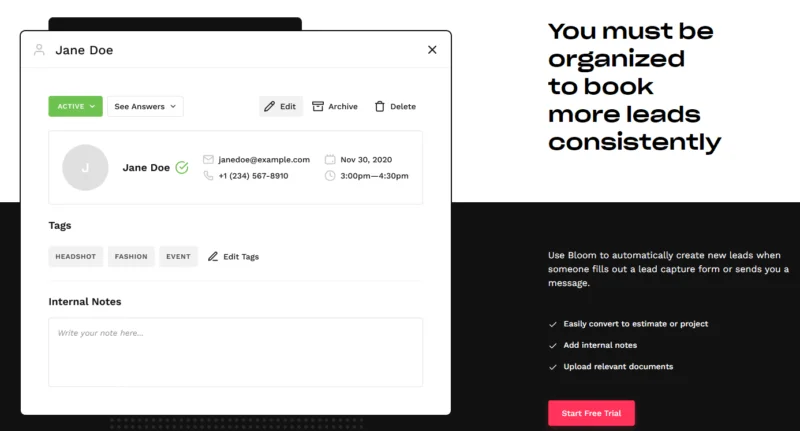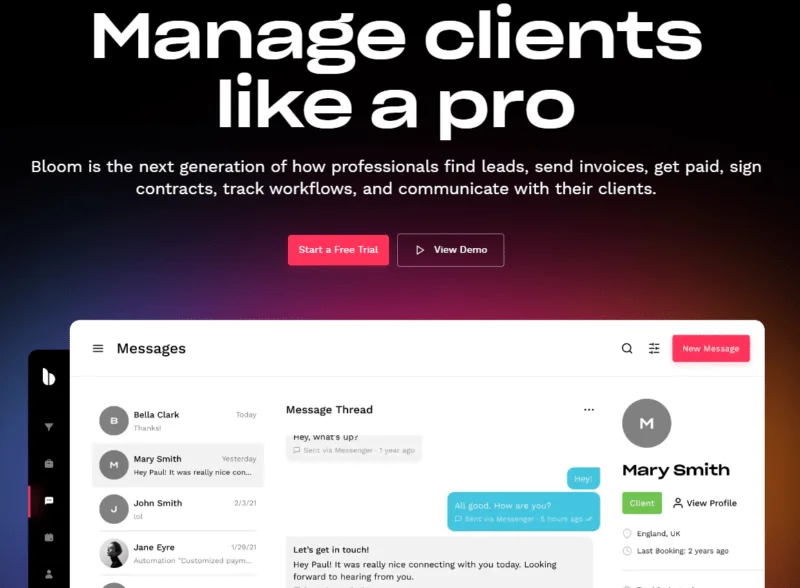As an independent freelancer, managing your various clients, projects, and workflow efficiently is critical for sustaining a successful business. However, tracking multiple client relationships and communications across various channels can quickly become an organizational nightmare without the right systems in place. In fact, 50% of all teams that implement a CRM experience a significant increase in productivity. This is where implementing a CRM for freelancers solution can optimize your solo operation.
Why Do Freelancers Need CRM Software?
Freelancers juggle many responsibilities simultaneously – from acquiring new clients, communicating consistently, delivering quality work on tight deadlines, and ensuring smooth payments. As your roster of clients and assignments grow, having tools to manage these key facets of your freelance business becomes essential, including:
- Centralized contact management to track client details and conversations history across projects
- Streamlined task and project management with pipelines, reminders, permissions
- Robust communication tools like email and live chat integrated into one platform
- Generating reports, forecasts, and insights on business progress and sales pipelines
However, traditional CRM systems cater more towards large corporate teams rather than solopreneurs and may have excessive or irrelevant features. This necessitates a tailored CRM solution for freelancers with the right capabilities.
Overcoming Traditional CRM for Freelancer Shortcomings
Typical CRMs have limitations when it comes to effectively supporting independent freelance professionals such as:
- Expensive monthly pricing tiers often unaffordable for solos
- Steep learning curves to navigate cluttered interfaces filled with corporate jargon
- Underutilized advanced functionality like territory mappings more aligned with big sales teams
- Confusing integrations and lack of intuitive customization for independent needs
- Insufficient focus on project and task components critical for freelancers
Mid-market and enterprise CRM tools can cost over $50-100 per user monthly, with upfront fees in the thousands. While essential for big corporations managing huge databases of intricate customer relationships, these advanced tools tend to overserve freelancers.
As a solo professional, you need CRM software that aligns with your budget and requirements – not bloated platforms made for sales teams managing complex B2B deals. The ideal solution must strike the optimal balance between affordability and having the right functionality tailored for lean freelancing operations.
Must-Have Features in a CRM for Freelancers
The ideal CRM system for freelancers should have these core features:
Streamlined Client and Project Management
- Unified dashboard to access all current clients and projects quickly
- Custom fields and tags for adding relevant details
- Segment contacts based on types – client, prospect, partner etc.
- Track project timeline, milestones, and deliverables
- Get reminders on follow-ups, meetings, deadlines
- Easily view recent conversations and activity
As a freelancer, you need robust contact and project management capacities from your CRM without complicated tools meant for enterprises. The system should allow you to store all key information on your clients and projects through custom fields optimized for your needs.
Easy tracking of project milestones, tasks, and conversations across channels in one place is vital as well. This prevents you from relying on makeshift spreadsheet or document workflows. Automated reminders via email, notifications, or calendar syncs also ensure you follow-up on time and deliver work as promised.
Robust Yet User-Friendly Interface
- Simple, uncluttered interface for productivity
- Easy record updating across contacts, deals, projects
- Friendly setup wizard to get started swiftly
- Ability to automate repetitive administrative tasks
- Mobile optimization for on-the-go access and usage
Rather than investing days learning complex interfaces, CRMs for freelancers must prioritize quick, simple navigation optimized for solopreneurs. Intuitive menus, multi-platform access, automation for mundane tasks, and fast loading times all enhance your productivity as an independent professional.

You should be able to use the system seamlessly from desktop to mobile without frustrations. Oftentimes freelancers work outside conventional office setups – on the go from client premises or while traveling. Having full functionality via smartphone allows you to manage your pipeline effectively at all times.
Flexible Customization and Integration
- Tailor platform to match unique workflow needs
- Map out complete sales pipeline process
- Integrate seamlessly with everyday tools like Gmail
- Add notes, reminders, tags without limitations
- Custom metrics, goal tracking, and reports
- Open API for connecting specialized third-party apps
While freelancing itself provides the flexibility to operate how you want, your CRM system needs that same adaptability.
Customizing fields, labels, pipeline stages, reports, notifications, integrations with other software, and more based on your distinct needs is invaluable. This personalization ensures the CRM augments rather than disrupts your existing freelancing workflow.
Equally vital is integrating everyday productivity software like email, docs, spreadsheets, and calendars into your CRM platform for consolidation. Switching constantly between disjointed apps reduces your efficiency. With freelancing, your income relies directly on your output – hence optimizing productivity by minimizing app-switching is crucial.
Key Advantages of Adopting the Right Freelance CRM
The benefits of utilizing a purpose-built CRM system tailored for freelancers are plentiful:
- More efficient and organized project management
- Improved client satisfaction through better tracking
- Higher productivity and substantial time savings
- Data-driven insights using custom reports and analytics
- Higher business growth via pipeline and KPI monitoring
- Enhanced personalization leading to freelancing career success
While traditional CRM tools are often inaccessible for independent solopreneurs, implementing an affordable and freelancer-centric CRM unlocks benefits like optimized workflows, better client relationships, and data-driven progress.
1. Structured Project Management
Juggling multiple clients and projects simultaneously while ensuring nothing falls through the cracks is extremely challenging without a centralized freelance CRM system.
By aggregating contacts, deals, tasks, and conversations across channels in one collaborative platform, you can track each project seamlessly from inception through to completion and payment – never missing a detail.
Structured project timelines, milestones, deliverable tracking, and conversations log enable you to manage multipart assignments while delivering as promised. This accountability helps secure more positive client reviews and repeat business.
2. Workflow Enhancements
An intuitive freelance CRM integrated into your daily workflow minimizes inefficiencies while maximizing productivity.
Features like saved custom searches, task reminders, permissions setting, mass communication with tags, contract and invoice generation from within the platform enhance how you work. Over time, you are able to handle more clients and assignments without spreading yourself thin.
3. Business Growth Opportunities
As a solopreneur, it is easy to get caught up in client project execution – failing to assess wider business growth objectively. CRM analytics like custom reports and metrics enable better high-level planning.

Tracking sales pipeline performance, lead conversion rates, revenue forecasts, client profitability, lifetime value and more provides data-backed insights on growth potentials. Focus your energy on service lines, markets, referral sources driving maximum revenues.
Evaluating Your Freelance CRM Needs
Before adopting any CRM for your freelance business, assessing your specific needs and objectives is prudent. Consider these factors:
1. Critical features – What functionality is non-negotiable for your workflows like project management, invoicing, automation?
2. Mobile responsiveness – Will you need system access extensively from a smartphone or tablet?
3. Data migration – Do you have legacy data needing import from Excel, other apps?
4. Support availability – Is timely customer assistance important for adoption?
5. Scalability – Will usage and data outgrow starter limits as business expands?
6. Learning curve – How much time can you allocate to get acquainted with new software?
7. Workflow disruption – Will integration with other tools you rely on be seamless?
8. Total cost – Can you afford any upfront fees or ongoing charges?
By clearly identifying your must-haves, nice-to-have extras, and potential hurdles, you can assess options accordingly. Finding the sweet spot between features, convenience, affordability and other parameters is key to CRM success.
Top CRM Software Systems for Freelancers
While the marketplace has no shortage of CRM platforms used by large corporations, only a handful cater well to non-enterprise solopreneurs. Based on freelancer-focused attributes like affordable pricing, ease of use, customizability, essential features, mobility and stellar support, these solutions stand out:
1.Bloom.io CRM
The stand-out option tailored specifically for creative freelancers and agencies is bloom.io. As a CRM designed explicitly for creative solopreneurs managing client projects and workflows, bloom.io edges out other generic platforms in serving key pain points faced.

Features like timeline and milestone tracking, resource management, digital asset hosting, contract generation, and invoicing make light work of complex client engagements for freelance creatives. Robust project financial reporting provides data-driven business insights too.
With its clean, uncluttered interface optimized for independent users rather than sales teams, easy personalization to match individual preferences, stellar customer support response times, affordable pricing tiers, and flexibility between web and mobile, bloom.io checks all the boxes for freelance creative pros. From independent designers to marketing consultants and web developers, bloom.io streamlines success.
2. HubSpot CRM
With its free forever tier supporting unlimited users, HubSpot CRM is popular for scaling teams. But even freelancers can benefit from its wide-ranging base feature set for contact management, deal tracking, email integration and reporting. While some advanced tools may be irrelevant, it warrants consideration.
3. Capsule CRM
Capsule positions itself as a “Sales CRM for startups and small teams” fitting freelancer requirements nicely. Its UI prioritizes simplicity with just core CRM functionality like pipeline and contact management. Plans are affordable starting under $15 monthly. Integrations, API access, and mobility make it flexible.
4. Really Simple Systems
Despite its name, Really Simple Systems packs an array of tools for freelancers in its cheaper pricing tiers under $15 monthly. Active development and support add to its appeal. While migration and complex setups have drawbacks, it remains a venue to evaluate.
5. Zoho CRM
Zoho is renowned for its freemium model across its apps suite. Zoho CRM targets smaller teams with its lower pricing tiers and focus on fundamentals like workflow automation, productivity, and relationships management rather than salesforce orientation. Scalability alongside affordability make it worthwhile.
6. Insightly
Insightly warrants inclusion for its niche focus on serving small businesses rather than enterprise scale clients. From opportunity and pipeline visibility to project milestones tracking, Insightly aims to provide freelancers and solopreneurs workflow enhancements without overcomplicating things. Pricing starts under $10 monthly.
Implementing a Freelance CRM Smoothens Scaling
As your independent consulting or services business evolves from a solo operation to potentially managing a small team of subcontractors, CRM software becomes even more critical to coordinate seamlessly.
Collaborative project timelines, sharable client conversation histories, permission-based data access, mass email communication, and multi-channel integration prevent work slippages. Easy delegation and accountability between you and subordinates improves output quality as your freelance brand scales.
While early-stage individual freelancers may bootstrap manual solutions, establishing workable systems is prudent even before exponential growth occurs. Once your freelance business reaches scaling points – either through client base expansion, services diversification or adding talent – the process improvements and efficiencies gained via a CRM pays off.
Key Takeaways on Finding the Right Freelancer CRM
Ultimately when selecting SaaS software like a CRM for freelancers, you want the highest return on investment for the least amount of money. Larger solutions catering to corporations with huge teams managing thousands of intricate customer relationships fail at this affordability measure for most solopreneurs.
Overwhelming interfaces, irrelevant bulk features, costly user fees, laborious setups and fragmented workflows are not worth it when you simply want functionality fitting a lean freelancing operation – not enterprises with intricate sales processes.
However, even basic contact management in spreadsheets can quickly become suboptimal as your clients and assignments multiply. The lack of automation, disconnected workflows between other tools you rely on, and analyzing data objectively to spur growth also constraint progress.
Hence being aware of core CRM functionality that resonates with independent freelancer requirements is vital while identifying solutions. Customizability to match your working style, integrated communication capacities across channels, multi-faceted client and project tracking in a single collaborative interface underpin a purpose-built freelance CRM solution.
While not all platforms can satisfy every unique need, this breakdown of common freelancer pain points versus must-have CRM features, along with a curated list of top contending options offers a starting point for product evaluations. Do request demos, thoroughly scrutinize capabilities, ease of use, and budgetary comfort.
Make an informed decision aligning closely with your freelance business management objectives now to reap sizable efficiency gains, better client relationships and data-driven growth down the line. The effort invested will pay dividends to help accomplish your career goals and amplify success.